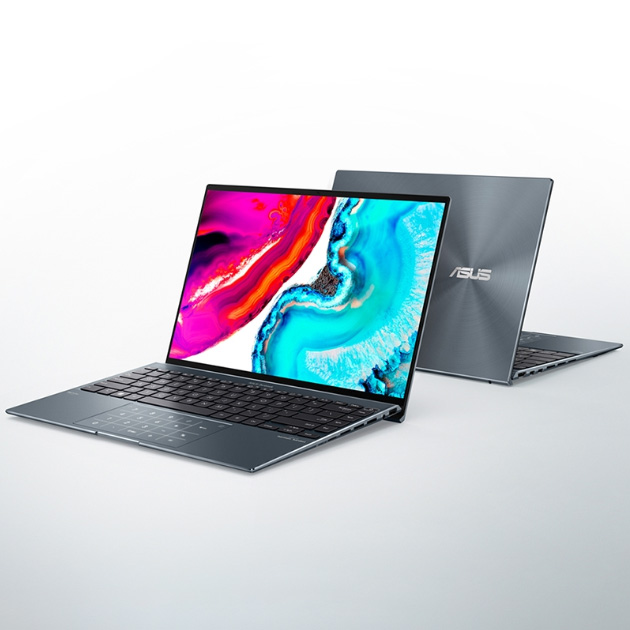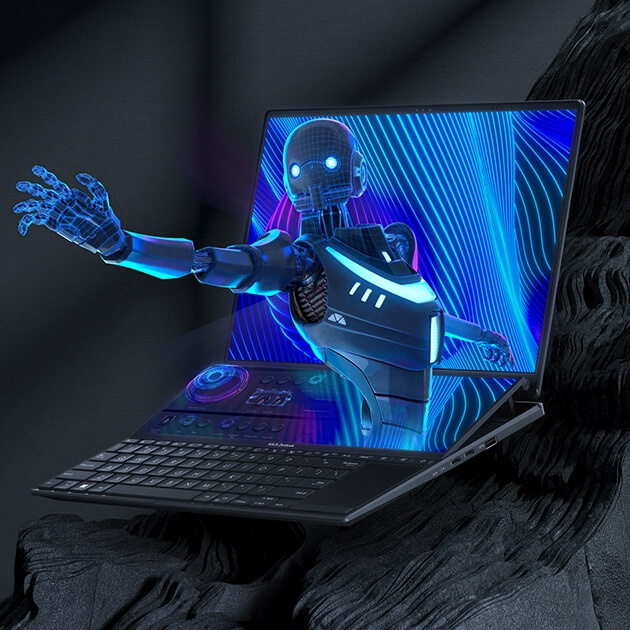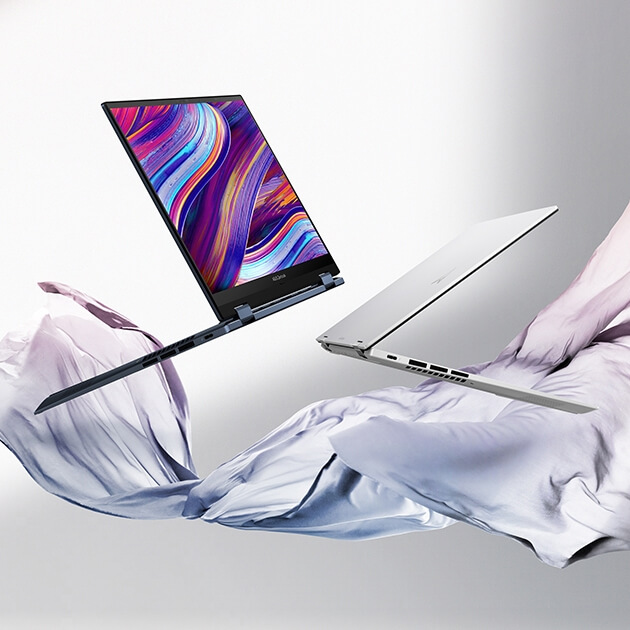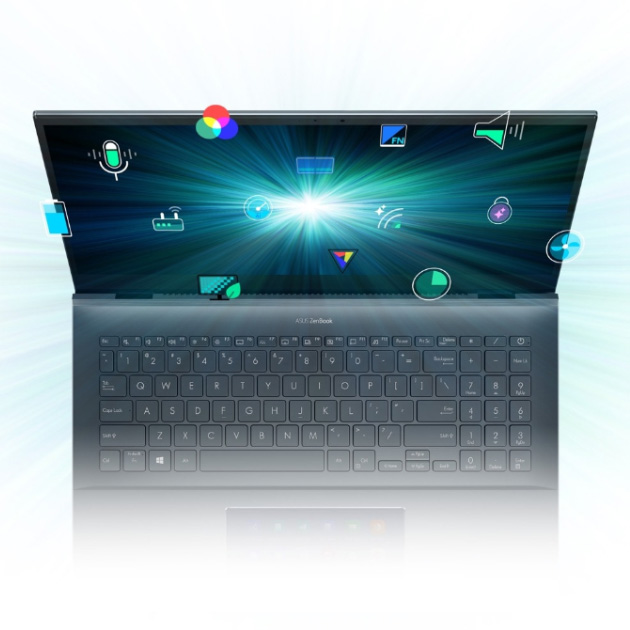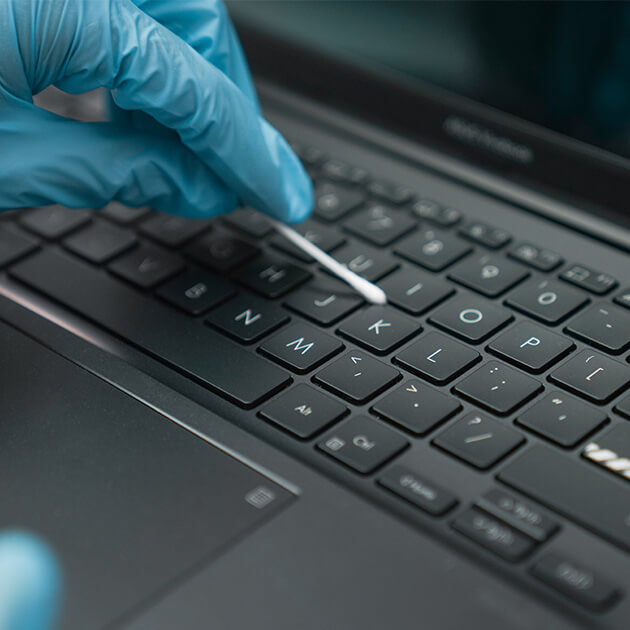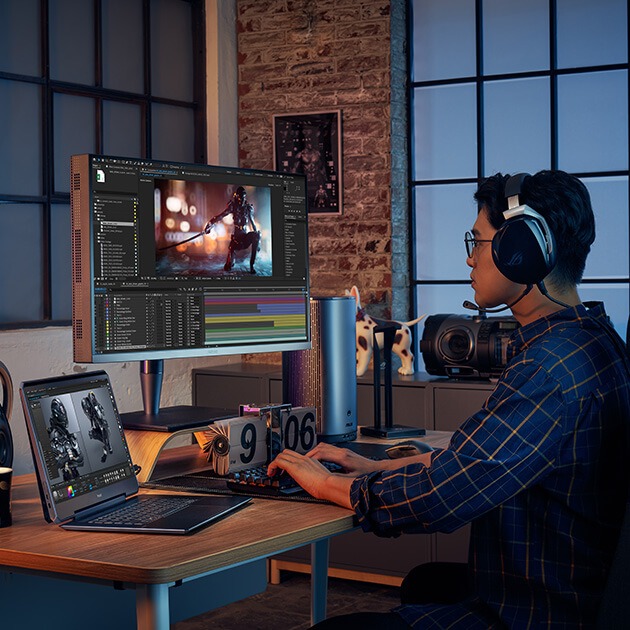
Nov. 30 2022
So, you just got your hands on a brand-new laptop. You're
wondering how to maximize your return on the investment and keep
it looking and running like new for as long as possible.
Sounds about right? Here are 10 laptop care tips that will help
make sure your computer stays in good shape, on the outside and
inside, for years to come.
Keep Food, Drinks, and Liquids Away
It's common sense that electricity and water aren't a good
combination. Unfortunately, liquids or breadcrumbs and laptop
keyboards, for example, aren’t either.
One of the most important ways to ensure your laptop's longevity
is to keep it away from food and beverages. But if you’re going
to have a drink while working, make sure to keep your cup far
enough away from the computer that, in case of a spill, liquid
doesn't go directly on your laptop's keyboard. 20-30 centimeters
should do it.
Another option is to use a laptop stand that lifts your machine
up, keeping it away from liquids and food.
Otherwise, if you're working at the desk while eating or
drinking, place the computer as far away from the edge as
possible. This way crumbs or liquid won't fall straight on the
keyboard.
Invest in Dedicated Cleaning Solutions
It is crucial to clean your laptop regularly. Make sure to pay
special attention to the keyboard, touchpad, display surface,
and vents.
Below are some small investments you can make to help in keeping
your laptop clean.
Get a soft microfiber cloth for your laptop screen, and always
have a container of 75% rubbing alcohol handy, so you can use it
as a disinfectant when wiping the screen or keyboard.
Another important purchase is an air blaster (which usually
comes in a can).
Finally, invest in a small, soft brush and cotton swabs.
The key is to make sure all the products are appropriate for
laptop maintenance, as using the wrong product can scratch
surfaces. For instance, screen wipes will have information about
suitability for computers screens on the label. Do not use
typical household cleaners or dish soap. Also avoid paper
towels.
Laptop cleaning kits that combine all the mentioned are
available and inexpensive. You can get one at your local store
or via an e-commerce platform of your choice.
We have another article that details
how to clean your laptop correctly and safely. Give it a read!
Increase Battery Lifespan
Even the most impressive laptop battery life can deteriorate
over time. It's important to optimize the battery settings for
increased longevity.
The first thing you need to know is that you should keep your
laptop plugged in as long as you can. If you're working at the
desk most of the time, simply keep the power cord plugged in.
Contrary to popular belief, overcharging your laptop's battery
is not as much of an issue as you might think. ASUS makes sure
that when your computer reaches full charge, the power cord
simply stops providing electricity until needed again.
Your computer settings can help you optimize your system to
maximize battery health. If you're using an ASUS laptop, visit
MyASUS customization options. Under Power & Performance, you can
change the charging option to Battery health charging ― which is
a great option for those who mostly use the laptop at their
desks. This will keep your battery at 80% charge maximum.
Full charge is great when you are on the move. If you'd like to
keep your battery healthy for as long as possible, however, the
Battery health charging is best.
Also, if possible, never deplete your battery completely.
Letting your battery drop to 0% before recharging is proven to
be damaging to the battery's health.
Let Your Laptop Breathe
When your computer is running, its components get hot. Different
laptops handle cooling in different ways. Some laptops come with
innovative ways that improve airflow. Examples include the
ErgoLift hinge in a
Zenbook 14X OLED
or the vents under the ScreenPad Plus in the
Zenbook Pro 14 Duo OLED.
As a general rule, to ensure proper cooling, you should place
your laptop on a hard, even surface like a table or desk.
Setting your laptop on soft materials such as pillows or cloth
of any kind can prevent the necessary heat dissipation.
If you really want to use your laptop in bed or on your lap,
invest in a laptop stand specially designed for that purpose.
And a reminder: If you decide to carry your computer out,
remember to turn it off before you put it in the bag. If it
keeps working in an enclosure, the vents are covered ―
preventing necessary airflow, which can lead to damage due to
overheating.
Invest in a Protective Sleeve or Bag
It is important to invest in a dedicated carrier for your laptop
to help prevent damage. Plenty of solutions are available to
choose from. The simplest is a laptop sleeve that can allow you
to safely transport your computer in your favorite bag or
hand-carry.
You can also look into buying a laptop bag. These usually come
with a couple of partitions that help you carry other things,
such as a power cord, mouse, earphones or dongles.
As another option, many commercially available backpacks also
come with a well-padded dedicated laptop partition.
In any case, when choosing a laptop carrier, make sure there is
plenty of padding. A simple neoprene sleeve may not provide
enough protection. We recommend choosing a brand that
specializes in computer products.
You can select something from
ASUS
or some other reputable brand that offers computer carriers.
Store Your Device Properly
Where and how you store your machine matters, particularly when
it comes to sunlight exposure. Leaving your laptop near a window
or inside the car on a hot day is a recipe for disaster.
If you live in a country with a humid climate, it's good to turn
on a dehumidifier in the room where you keep your computer.
Water (especially salt-water, if you live near the sea) in the
air can accelerate the degradation of your computer parts.
As a rule of thumb, don't put anything on top of your laptop. It
may be tempting to see the flat surface of your laptop cover as
an attractive place to store your mugs, computer chargers, and
other things. Aside from potential aesthetic damage, putting
weight on the laptop's cover applies pressure. This can cause
deformation of the chassis or screen cracks. It can even reduce
the distance between the screen surface and the keyboard, which
can lead to scratches on the glass.
Investing in a silicon keyboard cover can help protect your
screen from scratches. It also helps in protecting your keyboard
from liquids.
A screen protection film can help with keeping your display in a
good condition, but even with the two layers of protection, it's
still crucial to make sure you don't put anything on top of your
laptop.
Finally, if you own a 2-in-1 device with a 360° screen hinge
like the
Zenbook S 13 Flip OLED, make sure to always close it down so that the screen faces
the keyboard instead of outwards. This way, you can limit
exposure of the screen to damage and scratching, and prevent
dust from getting inside of your keyboard.
Keep Software Up to Date
Make sure to keep your laptop updated. Outdated apps and systems
can run slower and cause compatibility issues, which can expose
you to security issues and also hinder your computer's
performance.
To take full advantage of the most up-to-date software, make
sure to enable automatic updates, or if you prefer, regularly
check for updates yourself.
To make sure your Windows system is up to date, go to Settings,
then Update & Security, then Windows Updates; then click Check
for Updates.
To automatically update your apps, visit Microsoft Store. At the
upper right corner of the interface, select the account menu
(the three dots) and then select Settings. Under App updates,
set Update apps automatically to the On position.
Remove Unused Apps and Files
Many laptop users complain that their computers get slower over
time. One of the main culprits that causes slowdowns is
overloading that results from having too many apps on the
device.
To avoid this common problem, you will need to develop a couple
of good habits.
Start with carefully evaluating which apps you really need; then
remove all of the apps that don’t fall into this category.
Remember: you can always download an app as you need it.
Regularly review the list of applications installed on your
computer, and if you identify any that you are not using,
uninstall them. Along with potentially helping your computer run
faster, it also frees up space.
Another crucial step is to manage the auto-launch of
applications. Many apps are automatically set to start as soon
as you turn on your computer, which slows down booting up the
computer. Only auto-launch what's necessary.
To change which apps launch on startup, go to Task Manager (Alt
+ Ctrl + Del), then click Task Manager; click More Details, then
go to the Startup tab. Review which apps are set to launch
automatically. Make sure only essential apps are set to open
upon startup.
Also, if you any documents, images or videos (the last are
usually the heaviest) that you don't need anymore, delete them
to free up storage space.
If you're afraid of losing important files or simply need to
keep lots of them for work, it might be a good idea to invest in
another storage space. Either a cloud service or an external
hard drive work well.
Stay Virus-Free
Computer viruses and other malware can slow your laptop down,
and expose your files, passwords and activity history.
The first step in battling this is to install reputable
antivirus software and run scans regularly (you can also
automate that). Unfortunately, to get proper protection, you may
need to pay for the software. Not all antivirus software is
equal, and quality tends to come at a price. We recommend McAfee
antivirus.
To help prevent viruses from infecting your computer, avoid
websites with a doubtful reputation (there are telltale signs
you can easily identify, like inappropriate ads). Do not click
links that you aren't sure about, especially from companies that
you wouldn't describe as reputable.
When installing applications, only download them either from
Microsoft Store or directly from the developer's website.
Also, be conscious of email attachments. If you have any doubts
about the sender, it is best to simply not open the attachments
─ especially if you notice the file extension is .exe.
Future-Proof Performance
It might be a good idea to buy a bit more powerful laptop than
you need right now, since laptops aren’t as easily customizable
as desktops.
For example, if you are planning to buy a device with an Intel®
Core® i5 CPU, maybe look into an i7 option instead. If you're
used to running your computer on 8 GB RAM, think about buying
one with 16 GB.
Oftentimes, the newer the software, the more power it will
require ─ you can especially feel that if you're a gamer.
Spending a little more right now for a more powerful machine can
translate to savings in the future―because your laptop is likely
to be better suited to handle future software.
Some devices (especially creator and gaming laptops) also come
with storage or memory expansion slots. It is a good idea to
look into such machines if you expect heavier workloads in the
future.
Why Take Care of Your Laptop?
Maintaining good habits can extend your laptop's longevity.
Many users buy a laptop every couple of years (average laptop
lifespan is 3–5 years). Taking measures to ensure that your
laptops runs longer can save you money over the long term ―
because you don’t have to replace the device as soon as you
otherwise may need to.
Check out the everyday-use ASUS laptop lineup







